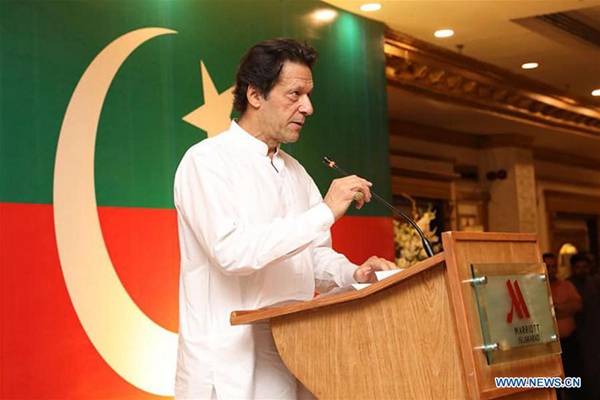Can Pakistan's new government bring a change?
- By Sajjad Malik
 0 Comment(s)
0 Comment(s) Print
Print E-mail China.org.cn, August 25, 2018
E-mail China.org.cn, August 25, 2018
Pakistan's new Prime Minister Imran Khan – a former cricketing icon – has formally taken the driver's seat after taking the oath of office on August 18. His long political struggle spanning over 22 years was rewarded when his Pakistan Tehreek-i-Insaf (Pakistan Movement for Justice) party won the election on July 25.

Khan, in his victory speech, termed his success as the first phase of the struggle. The second and even far challenging phase for him has just begun and it is all about changing the destiny of his people.
Even after over seven decades of independence, the dream of a prosperous Pakistan could not be achieved. In his long struggle, Khan lambasted corruption as the chief reason of the country's problems and promised to root it out by introducing a clean and accountable government if given a chance to rule. His wish has been granted. Now it's time to fulfill the dream.
He takes office amidst gigantic problems in the country. In general, there are two kinds of challenges. First are the domestic issues, like improving the economy, fighting corruption, repairing infrastructure, and dealing with power shortages, illiteracy, lack of health facilities and water scarcity.
Pakistan's economicchallenges are enormous. Asad Umer, the finance minister, said before taking oath that the country immediately needed $12 billion to keep afloat. As exports have stagnated, foreign remittance is not enough and the tax-collection system is outdated. The country needs an urgent bailout package either from friends like China and Saudi Arabia or from the IMF.
Militancy is another serious domestic issue. More than 200 people were killed in the terrorist attacks during the election campaign. Khan has been a vehement supporter of talks with militants who wreaked havoc in the country. He was dubbed by his opponents as "Taliban Khan."
Through a series of operations, Pakistan's security forces have defeated militants and eliminated their safe havens but the threat is not over. Rather, there is a new danger in the form of the Islamic State. It will be interesting to see how Khan deals with different groups of militants.
Other domestic issues are mostly structural in nature and Khan will have to fight pitched battles with an inefficient and corrupt officialdom to bring the meaningful change which he promised.
However, implementing change will not be easy as his list of ministers and advisers include mostly old faces, the so-called electable – who served in previous corrupt administrations and only joined the current one for ministerial slots.
The second category of challenges is Pakistan's foreign policy. On the top of the list is the strained ties with the United States. The root cause is ongoing violence in Afghanistan by the Taliban. The U.S. believes Pakistan has control over the Taliban and is not fully cooperating to make peace.
Pakistan, despite its own security compulsions and capacity issues, has tried to help America in Afghanistan but so far, without much success. The U.S. has expressed good wishes for Khan and a desire to work with him. Reportedly, The U.S. Secretary of State will be visiting in early September to set out the terms of engagement, the differences between the two countries could prove to be a barrier to successful talks.
Ties with India and Afghanistan are also important and to some degree, dependent on relations with the U.S. Khan offered to talk to both countries in his victory speech but the million dollar question is:Can he translate his vision of peaceful ties into a reality?
The most important strategic and economic partner of Pakistan is China. Khan has already indicated that a strategic mission of his government is to deepen the ties with the Asian giant. While China and Pakistan have unanimity of views on issues, it will be important to expedite work on the China-Pakistan Economic Corridor – a flagship project under the Belt and Road Initiative.
Khan has a reputation of never buckling before challenges. His former teammates remember him for his grit and determination. But leading an 11-memebr cricket team and playing with set rules is different from leading a nation of more than 200 million in a world where the rules are far more"gray"in nature.
Khan's supporters and opponents will wait with baited breath to see if he can deliver the moon he promised. His slogans are "change" and "Naya (new) Pakistan." Khan needs to show colors of change and new Pakistan within the next six months on both domestic and foreign policy fronts. His task is arduous but not impossible.
Sajjad Malik is a columnist with China.org.cn. For more information please visit:
http://www.ccgp-fushun.com/opinion/SajjadMalik.htm
Opinion articles reflect the views of their authors, not necessarily those of China.org.cn.





